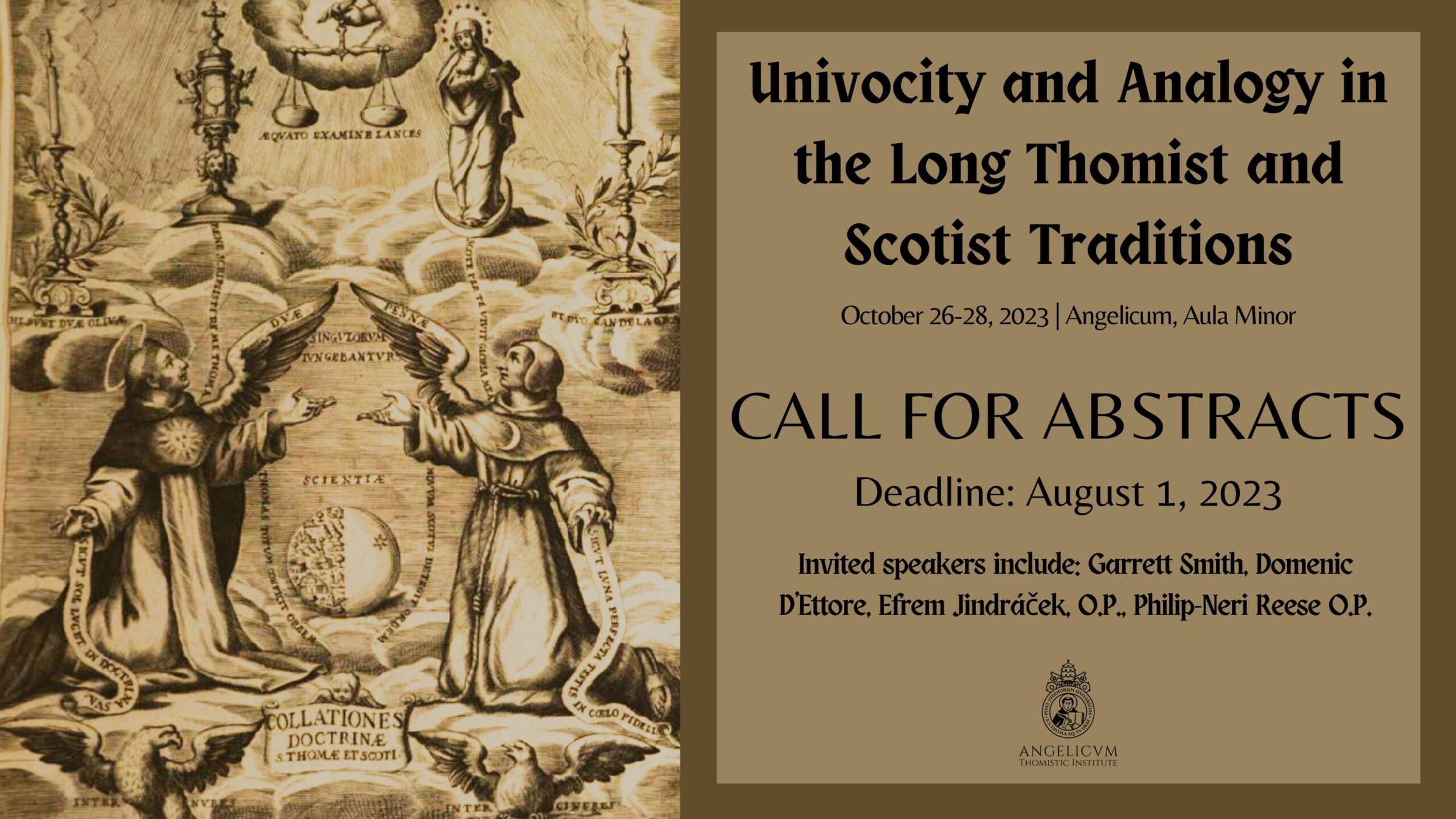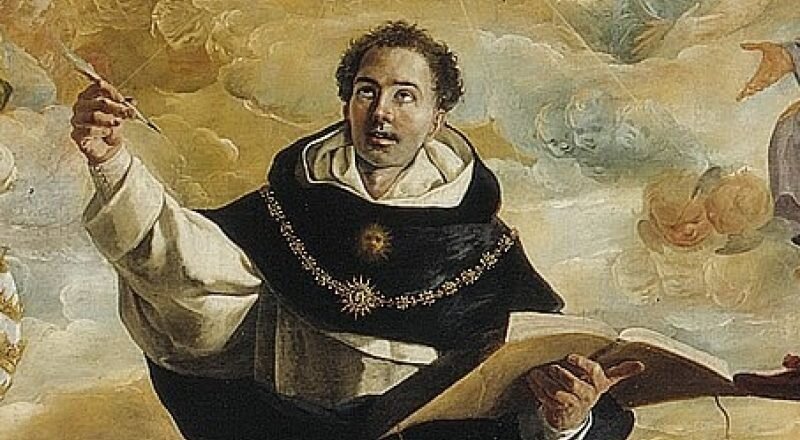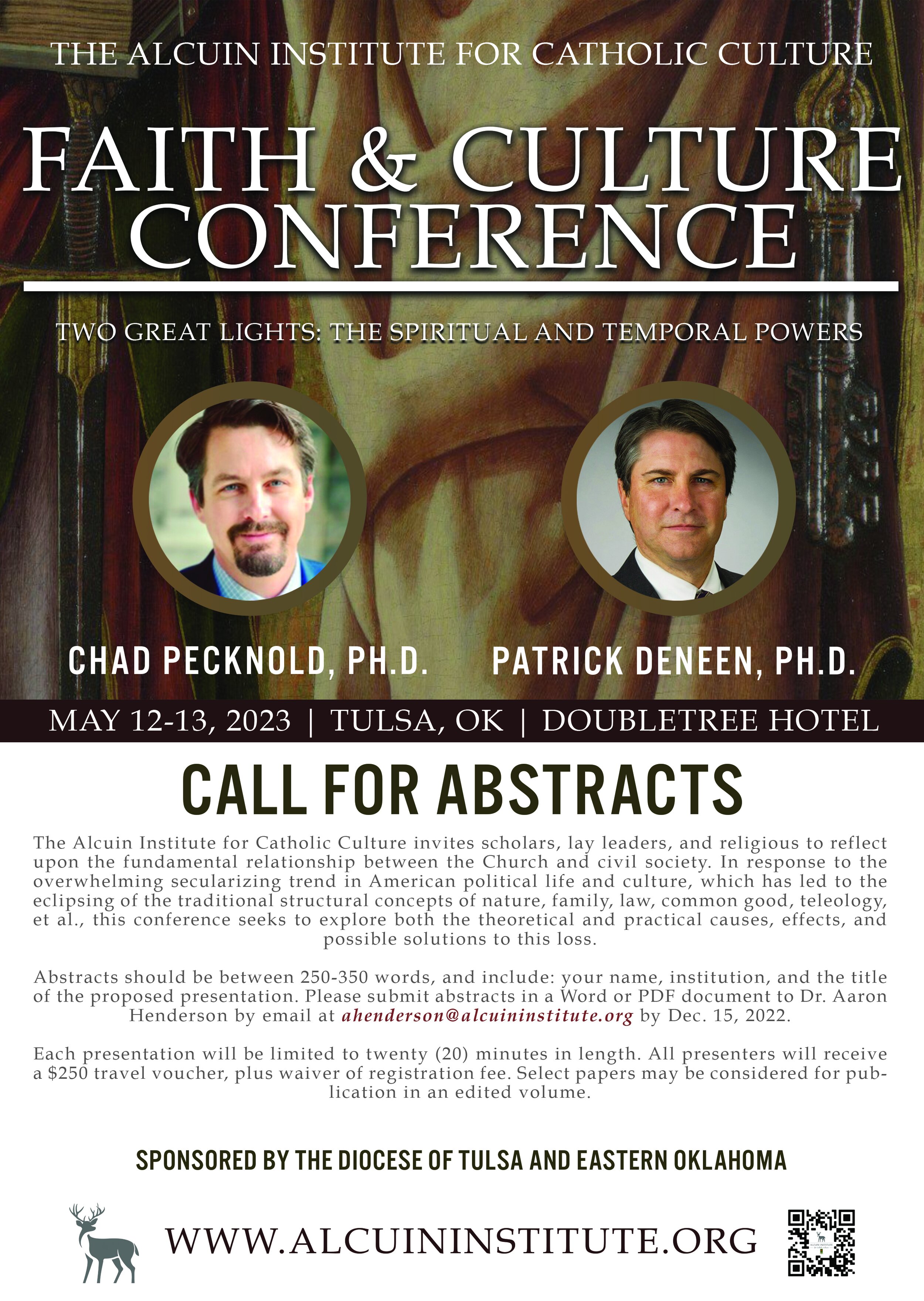Calls for Paper — Angelicum Conference on Univocity and Analogy
/Univocity and Analogy in the Long Thomist and Scotist Traditions
For more information or to submit an abstract, follow this link.

For more information or to submit an abstract, follow this link.

The St. Bernard’s School of Theology and Ministry announces a conference on Veritatis Splendor and its ecclesial reception.
Conference Date: September 29th – October 1st, 2024, in Rochester, NY
Please submit a 300-word title and abstract by June 1st, 2023.
Submit abstracts via this form. More details from the conference website below.
Veritatis Splendor was written by Pope St. John Paul II as a response to the Second Vatican Council’s call for the renewal of moral theology. The Second Vatican Council invited scholars to take “special care for the renewal of moral theology,” in such a way that “its scientific presentation, increasingly based on the teaching of Scripture, will cast light on the exalted vocation of the faithful in Christ and on their obligation to bear fruit in charity for the life of the world.” The Council also encouraged theologians, “while respecting the methods and requirements of theological science, to look for a more appropriate way of communicating doctrine to the people of their time[.]” This led to a further invitation, one extended to all the faithful, but addressed to theologians in particular: “The faithful should live in the closest contact with others of their time, and should work for a perfect understanding of their modes of thought and feelings as expressed in their culture.” [VS 29]
Veritatis Splendor thereby represents a broader postconciliar movement of renewal in moral theology that permeates the pontificates of the last 60 years. Most recently, Pope Francis has called to mind again and again the missionary context of moral theology: “the Church’s pastoral ministry cannot be obsessed with the transmission of a disjointed multitude of doctrines to be imposed insistently. Proclamation in a missionary style focuses on the essentials, on the necessary things: this is also what fascinates and attracts more, what makes the heart burn. . . . The proposal of the gospel must be more simple, profound, radiant. It is from this proposition that the moral consequences then flow.” (Francis speaking to Antonio Spadaro, in A Big Heart Open to God: A Conversation with Pope Francis [New York: Harper One, 2013], 34-35).
The 30th anniversary of Veritatis Splendor, also the 10th anniversary of Francis’s pontificate, seems an appropriate moment to consider the legacy of the renewal of moral theology in the postconciliar era, with a special focus on the text of Veritatis Splendor and its ecclesial reception.
The purpose of the conference is threefold: (1) to understand and appreciate Veritatis Splendor as the most significant magisterial document expressive of the postconciliar renewal in moral theology; (2) to continue and further the trajectories of inquiry, contemplation, and engagement present within Veritatis Splendor; (3) to manifest a consideration of Church history and pontificates through a hermeneutic of reform (and not of simply continuity or discontinuity), which permits a truly ecclesial reflection on moral theology, human action, and the call to accompaniment, requiring a “discernment [which] can never prescind from the Gospel demands of truth and charity, as proposed by the Church” (Amoris Laetitia, 300).
We invite papers that will explore the renewal of moral theology from various perspectives, including those beyond the traditional field of moral theology. Submissions are encouraged that take up the above themes in the context of scriptural exegesis, philosophical inquiry, literature, spiritual theology, pastoral theology, canon law, ecclesiology, and/or interdisciplinary approaches. Papers with explicit reference to Veritatis Splendor will be privileged. Specific topics might include:
The interpretation of the post-conciliar renewal of moral theology via a hermeneutic of reform;
The failures and opportunities surrounding the implementation and reception of Veritatis Splendor;
The relationship between scripture and moral theology;
The relationship between Patristic theology and moral theology;
The legacy of Thomistic moral theology vis-à-vis the renewal of theology, Veritatis Splendor, and Amoris Laetitia;
The role of Veritatis Splendor in the work of prominent moral theologians;
Theodramatic and pastoral expositions of accompaniment as a pastoral principle;
The implementation of Veritatis Splendor throughout the pontificates of John Paul II, Benedict, and Francis;
Contemporary moral challenges posed by new technologies and cultural movements
The IGTM has issued a Call for Papers for its 2024 conference meeting in Utrecht. Abstracts of 100 words should be e-mailed by December 30.
Read MoreThe Sacra Doctrina Project plans to host two satellite sessions at the 2023 meeting of the American Catholic Philosophical Association in Houston, Texas (Nov. 16-19). Abstracts of 150-250 words should be e-mailed by May 15 to sacradoctrinaproject@gmail.com.
Read More
From June 20-27, a seminar will be hosted at the Angelicum in Rome entitled, “Eternal Beauty - Principles and Disputations.” Participants will be provided with accommodations and meals - and travel stipends are available. The program, which is being organized by the Institute for Human Ecology at the Catholic University of America, is tailored for senior graduate students and junior academics. Seminar leaders include Fr. Thomas Joseph White, Fr. Michael Sherwin, Fr. Philip Neri Reese, Thomas Hibbs, and D.C. Schindler. Click here for more information.
From the Leo Elders Foundation:

The Leo Elders Junior Scholar Award seeks to reward and encourage young scholarship on St. Thomas Aquinas in the spirit of the work of Leo Elders.
Father Leo Elders SVD (1926 - 2019) was a Dutch Thomist active at Nanzan University (Japan), the Center for Thomistic Studies (Texas), the Congregation for the Doctrine of the Faith, the Angelicum and several seminaries. Throughout his life, his distinguished research and teaching was instrumental in shaping Biblical Thomism and ressourcement Thomism in the 20th century scholarship on Aquinas. His works are characterized by a thoroughgoing interest in the historical background of St. Thomas as well as his sources, most notably Aristotle. This same focus on context also enabled fr. Elders to position the thought of St. Thomas in modern philosophic debates, making clear its meaning and highlighting its importance.
The Junior Scholar Award is meant as an encouragement to those engaging with the work of Leo Elders and his sources. It is awarded by the Leo Elders Foundation, which aims to preserve and promote the legacy of fr. Elders and his works.
In 2023 the Foundation will host its first Junior Scholar Essay Contest.
Any scholar who has not attained the rank of associate professor is invited to submit a paper.
Topic: The topic of the essay should engage systematically with the work of Leo Elders and/or the central themes of his writings on the thought of Thomas Aquinas.
Manuscripts, written in English, must be submitted electronically by no later than September 1, 2023. The manuscript should not exceed 12,000 words (including notes) and should be accompanied by an abstract of up to 150 words and a CV. The cover letter should indicate the author’s academic rank and that the submission is for the essay contest. Papers should be prepared for blind review.
The Board of the Foundation establishes an ad hoc committee. The size of this committee depends on the number of applications received. Scholarly competences that reflect the topics of the received papers will be a factor in selecting the committee members.
The author(s) of the winning essay will be notified by November 1, 2023.
Winning essay: The author of a single-authored winning paper will receive a $750 award. The winning essay will be published in the English Edition of Nova et Vetera and specially designated in the journal as winner of the contest.
Additional inquiries may be directed to:
Dr. Jörgen Vijgen (Leo Elders Foundation):
jorgen.vijgen@skynet.be
The Thomistic Summer Conference at Thomas Aquinas College (California campus) has issued its call for papers on the theme of “The Soul in the Philosophy and Theology of St. Thomas.” The conference will take place June 15–18, 2023, at the West Coast campus of Thomas Aquinas College. Its featured speakers are Steven J. Jensen, Michael A. Augros, Marie I. George, and John J. Goyette.
From the call for papers:
We welcome proposals pertaining to any aspect of the conference theme. Possible topics may include:
The nature of the soul and its powers: the soul as substantial form; the union of the soul and the body; the soul as a principle of life in generation; the order found in the powers of the soul—intellect, sensation, and nutrition; what it means to say that all knowledge begins with the senses; the distinction between the agent intellect and the possible intellect
Proofs for the existence, immateriality, and immortality of the human soul
The importance of the soul and its habits and powers in ethics and political philosophy
The human soul in sacred theology: the soul as an image of God and of the persons of the Trinity; the effect of original sin on the soul and its powers; the relation between the soul and sanctifying grace and the supernatural virtues; the human soul’s relation to the body and the importance of the resurrection; the knowledge of the separated soul
The study of the soul in the biological sciences (e.g., neuroscience, evolutionary theory) or the behavioral sciences (e.g., psychology), and how this relates to, or differs from, the study of the soul in philosophy and theology
Preference will be given to paper proposals that fit under the conference theme and engage directly with the text of St. Thomas.
Please submit a titled, 500-word abstract by February 15, 2023. Authors will be notified by February 28, 2023.

On the Theological Virtue of Faith
June 8-10, 2023 | Baltimore, MD
Hosted by St. Mary's Seminary & University

Papers are still being accepted for the Sacra Doctrina Project’s Conference on Faith. Last year’s conference had 80 attendees and 65 papers presented and this one promises to be at least as substantial. The Keynote Speakers are Lawrence Feingold, Michael J. Gorman, and Denys Turner. Also of note is that the University of Notre Dame Press, Emmaus Academic, and Eerdmans will have displays and CUA Press and Emmaus Academic will be providing some complimentary books. More info about the conference can be found here and abstracts can be submitted here.
Recently, a book in French has been published on various Canadian philosophers, including a few Thomists from Laval: Pierre-Alexandre Fradet’s book, Le désir du réel dans la philosophie québécoise. From a translation of the publisher’s release:
Who can spontaneously name philosophers from Québec? Who has ventured to read them? From which perspectives or through which lenses are they understood? Too few people are able to answer these questions, and that is why the present book does useful work by shining the spotlight on five major figures: Charles De Koninck, Thomas De Koninck, Jacques Lavigne, Charles Taylor, and Jean Grondin. These five philosophers of yesterday and today have kept afloat the desire to know the real, contrary to the many attempts at deconstruction that innervated the 20th century.
Rest assured: none of these philosophers claims to reveal once and for all the very essence of reality. But their works make it clear what absurdities one exposes oneself to when one affirms that the world is at worst a fabric of lies, at best, entirely a construct. By dwelling in turn on their various contributions, this work does not intend to play the card of Lionel Groulx against that of Paul-Émile Borduas, the card of tradition against that of modernity, the card of the past against that of the future. Rather, it seeks to show that there exists, before and after the Quiet Revolution, a Quebec philosophy worthy of the greatest attention.
Doctor of philosophy jointly supervised at the École Normale Supérieure in Lyon and Laval University, Pierre-Alexandre Fradet undertook postdoctoral research on Quebec philosophy at the University of Montreal. He has published several books, including Philosopher à travers le cinéma québécois (Hermann), Derrida-Bergson: Sur l’immédiateté (Hermann) and Une vie sans bon sens: Regard philosophique sur Pierre Perrault (Nota bene, with Olivier Ducharme). He co-edits two reviews: one on Quebec cinema and philosophy for Nouvelles Vues (with Sylvano Santini), the other on speculative realism for Spirale (with Tristan Garcia). Winner of one of the Grands Prix for independent journalism, he teaches with passion at the Cégep de Saint-Laurent.
For more information, see the publisher’s website.
Attend an upcoming conference in September 2023 to find out. See the details below or at this website, including registration. See the “Call for Papers” here.

To mark the 750th anniversary of the death of St. Thomas Aquinas, the Thomistic Institute and the Dominican House of Studies present a conference on St. Thomas’s thought with keynote addresses and a call for papers for shorter breakout sessions.
A group of major scholars will treat the theme of Thomas Aquinas as the Common Doctor, each from the perspective of his or her own expertise. Each contributor will treat the question of whether, and to what extent, Aquinas may (or may not) be considered a “common doctor” in theological and philosophical engagements today.
What? A three-day conference on the theme on Aquinas as the Common Doctor in contemporary theology and philosophy.
Where? Dominican House of Studies (487 Michigan Ave. NE, Washington, D.C. 20017)
When? Thursday, September 14 to Saturday, September 16, 2023
Each talk concludes with time for Q&A. Light refreshments, including snacks and coffee, will be served between the lectures.
Featuring:
Therese Cory (University of Notre Dame)
Fr. Serge-Thomas Bonino, O.P. (Angelicum)
Joseph Wawrykow (University of Notre Dame)
Matthew Levering (University of St. Mary of the Lake)
Fr. Thomas Joseph White, O.P. (Angelicum)
Russell Hittinger (University of Tulsa)
Call for papers
We invite paper proposals on themes related to whether, and to what extent, Aquinas may (or may not) be considered a “common doctor,” whether in matters theological, philosophical, or otherwise. In particular, we invite papers on: Philosophy of Nature; Metaphysics; Virtue Theory and Philosophical Ethics; Moral Theology; Scripture and Exegesis; Sacraments; Trinity; Christology; Creation; Nature and Grace; and Faith and Reason (including the engagement with contemporary science).
The Alcuin Institute has issued a call for papers for the upcoming 2023 conference. Visit the conference website here: https://alcuininstitute.org/conference.

The 2023 conference, theme, and call for papers from the Sacra Doctrina Project have been announced.

“In the Gospel of John, Jesus tells Martha, “I am the resurrection and the life; whoever believes in me, even if he dies, will live, and everyone who lives and believes in me will never die.” Moreover, Christ says, “Did I not tell you that if you believe you will see the glory of God?” (John 11:25-26, 40).
The age in which we live is undoubtedly secular; the existence of God and our utter contingency upon Him are largely unrecognized. God’s governance of the world goes unacknowledged as if by default. How are Christians to live in such a context? We invite papers that explore faith (both fides qua and fides quae) and contemporary challenges to it in both speculative and practical dimensions. Key questions include, but are not limited to: How does the theological virtue of faith relate to the spiritual life? What does implicit faith look like in our age? What are the Biblical foundations of Christian faith? To what extent should faith influence or be influenced by politics? How is faith aided or hindered by the philosophies most influential on the modern mind? The emphasis of this conference is the speculative treatment of faith itself, but proposals related to faith’s practical ramifications, expressions, and challenges are also welcome.”
Visit the conference page for more details or to submit an abstract.
Under the direction of the Sacra Doctrina Project